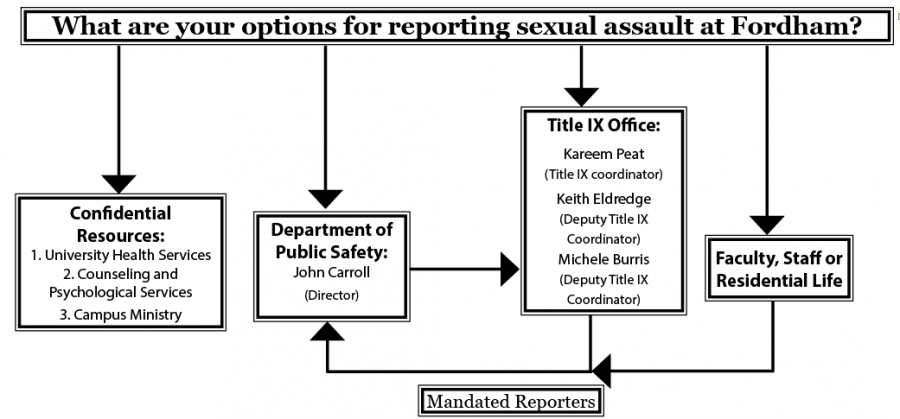Title IX Gender Disparity Raises Concerns
If a female student wants to report a Title IX case on campus, her options are almost exclusively male. (GRAPHIC ILLUSTRATION BY ESME BLEECKER-ADAMS/THE OBSERVER)
November 14, 2018
“The number of unreported cases is heavily influenced by the attitudes of current administration. If they provided us with greater support and compassion, maybe more people would feel comfortable coming forward.”
This is how Lis Ortiz, Fordham College at Lincoln Center (FCLC) ’20, a victim of sexual assault, feels following her “awful” experience reporting their case at Fordham. With a predominantly large presence of male staff members heading the Title IX process, questions about its contribution to the number of unreported sexual assault cases seem to emerge.
Reflecting on the way her Title IX case spiraled, Ortiz said she “wouldn’t wish it on anyone” and that “Fordham needs to do a much better job at protecting its students, specifically survivors of sexual assault.”
The response team dedicated to conducting the Title IX process consists of Title IX Coordinator Kareem Peat, Dean of Students and Deputy Title IX Coordinator Keith Eldredge, Director of Public Safety John Carroll and Deputy Title IX Coordinator Michele Burris. Students may also report their case of sexual assault to Campus Ministry, Health Services and Counseling Services, the only three confidential resources that are not mandated to share the case with the Title IX Office.
One of Public Safety’s duties forms the first step of the Title IX process: assigning the complainant an administrative support person (ASP). The ASP’s role entails informing the victim about their rights and options, in addition to offering them support. For instance, they have to explain what the conduct process looks like and provide the student with all available support resources, such as rape advocacy.
Most advisers, including the ASP on both Rose Hill and Lincoln Center campuses, are women, Peat emphasized.
However, in her case, Ortiz stated that “I was not assigned an ASP, nor was I aware that even existed.” Occasionally, faculty members of Residential Life checked up on her, but “it felt like an obligation for them to reach out,” she added. “Administration shouldn’t feel like it’s a chore to care about students’ well-being.” They also added that the Residential Life staff involved in her case “were the ones that victim-blamed me the most.”
Kareem Peat recently became the Title IX Coordinator at Fordham; he moved from his old office at Cornell University to his new one in Cunniffe House, at Rose Hill, in August 2018. He stated that “if a person is concerned with the gender of an individual assigned to their case, we would be happy to work with them to find an available person with whom they feel comfortable sharing their experience.”
If requested by the victim, Carroll said that Public Safety can provide a female investigator at any point during the process. He explained most victims approach their friends or the Resident Assistants on campus, though Public Safety is often called when seeking an immediate response.
Eldredge also stated that the Title IX Office will assign a new staff member if the victim has concerns related to gender or gender identity.
In Ortiz’s case, the Public Safety investigator was female, “but she wasn’t helpful.” Ortiz remembers being described as “hysterical” in the reports, despite being “calm and composed” throughout the entirety of the process. “I do think she played an active role in Fordham victim-blaming me,” she stated.
With regard to how female and female-identifying victims feel during the Title IX process, Carroll stated that “women have stated on occasion that they were more comfortable speaking with a female investigator — though that is not always the case.” A person of the same gender, or gender they identify with, may also be present in the room during every meeting, if requested by the student.
“Fordham has highly qualified women, both in Public Safety and in Student Affairs,” Carroll said. “It’s not clear that having more women in the process would necessarily increase the number of cases being reported: of course trauma-sensitive interviewers and investigators are critically important and available in all cases.”
Throughout his career in Title IX offices, Peat said he has only received one request, at his previous institution, to redirect the victim to a female investigator for comfort purposes.
Eldredge thinks gender and gender identity may be reasons behind students feeling more comfortable in starting the Title IX process. However, he does not believe there is a lack of female staff in the Title IX process. Burris thinks the same way: “as a female myself, I am confident that female staff are available throughout the process to assist female students at Fordham,” she stated.
The administration meets recurrently on an annual basis as they seek ways to improve and strengthen the Title IX process. They review survey results, conversations with the Fordham community and feedback from students involved in the process, Burris explained. “We are constantly striving to improve all processes at Fordham so they best meet the needs of our students and our community,” she stated.
The administration launched a campus climate survey in spring 2017, in which results showed that 50 percent of students did not feel the Title IX process helped them. “That’s a significant number and Fordham has not taken that survey to heart,” Diamantina Kefalas, FCLC ’19, said. As the current President of the Coalition Against Relationship and Sexual Violence, she has also been working alongside Eldredge and Director of Residential Life Jenifer Campbell with efforts to improve the Campus Assault and Relationship Education guide, specifically by gathering student complaints for Title IX.
“I think Fordham did everything right on paper,” Ortiz stated. “However, I would have hoped that they treated me more like a person and less like a number.” She wishes their well-being had been prioritized and her feelings respected in her experience with the Title IX process, “instead of being made to feel like [their] rape was an inconvenience to others.”
Balancing fairness, transparency, reliability, comprehensiveness and “an overall feeling of confidence in the process” is a part of Peat’s mission as the current Title IX coordinator. “We all strive to provide a high level of empathy, respect and professionalism whether the individual involved is a man, a woman, or gender non-conforming and/or gender non-binary,” he added.
“As part of my review of the Title IX process, I welcome all input from the Fordham community,” Peat concluded. “We all share a commitment to creating a safe and caring community that is free of sex- and/or gender-based discrimination.”













